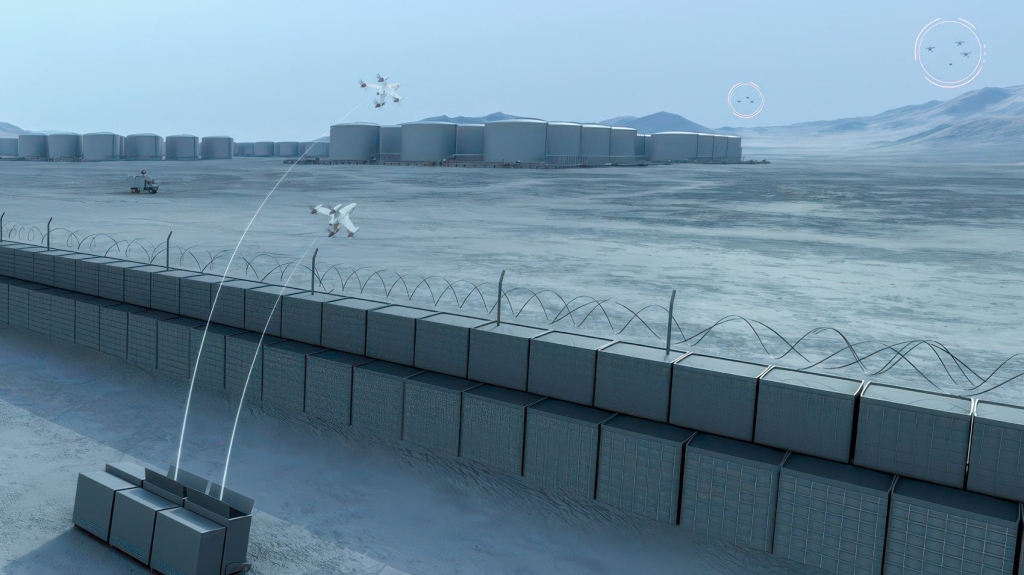MARSS’s New Drone Smashes Threats Out Of The Sky

In the world of counter-drone technology, the options have always been a trade-off. You can use a messy jammer, an expensive missile, or a risky net. Now, a Monaco-based company called MARSS has unveiled a brilliantly simple and brutally effective fourth option: a drone that just smashes the threat out of the sky. The Interceptor-MR is an AI-enabled, high-speed drone designed for a single purpose: to ram hostile drones with pure kinetic energy. It’s a low-collateral, cost-effective, and incredibly cool solution to one of the biggest problems on the modern battlefield.
A Reusable, Ramming Robot
The Interceptor-MR is a unique hybrid aircraft. It takes off vertically like a quadcopter from a smart, automated launch box. Once airborne, it transitions to fly like a fixed-wing plane, accelerating to incredible speeds of up to 80 m/s (over 175 mph).

Using its onboard AI and an infrared sensor in its nose, it autonomously hunts down its target, whether it’s a single drone or part of a swarm. Once it has a lock, it engages in a high-speed dogfight, maneuvering to slam directly into the hostile drone. The drone’s airframe is reinforced with titanium in the nose and wings to ensure it can withstand the impact.

What makes it so clever is its reusability. Against smaller drones, the Interceptor-MR can deploy a parachute after the impact and return to base to be used again. Against larger threats, like an Iranian-made Shahed, it’s a one-way trip, but at a cost that is a tiny fraction of a traditional air defense missile.
The Smarts Behind the Smash
The Interceptor-MR isn’t just a dumb battering ram; it’s an intelligent hunter. The real magic is the condensed version of MARSS’s powerful NiDAR ground system that is packed into the drone’s brain. This AI system fuses data from multiple sensors to detect, track, and classify threats with incredible speed and accuracy. This gives the drone a huge advantage: the ability to be aborted mid-mission. As MARSS Head of R&D Stephen Scott explained, “Unlike firing a missile, you can abort the mission and it will return to base.” If the target is identified as friendly at the last second, the operator can call it off. This is a critical safety feature that sets it apart from almost any other “hard kill” system. The entire system is designed for a layered defense. A single launcher can control up to 12 of these interceptors, creating a protective dome over a high-value asset, like a government building or a military base.
A Cost-Effective Killer
One of the biggest drivers behind the Interceptor’s design was cost. A single short-range air defense missile can cost upwards of $150,000. The Interceptor-MR is estimated to cost around one-fifth of that, completely changing the economic equation of drone defense. This makes it a sustainable solution for dealing with the threat of cheap, mass-produced drones. You can afford to launch multiple interceptors to counter a swarm without bankrupting your defense budget. It’s a smart solution, born from the real-world needs of protecting high-value assets in places like the Middle East.
DroneXL’s Take
It’s hard not to admire the beautiful, brutal simplicity of this idea. In an age of increasingly complex lasers and jammers, there is something incredibly satisfying about a solution that just says, “I’m going to fly really fast and smash into the bad guy.” It’s the most direct solution possible, and the engineering to make it work is just brilliant.
“Real talk,” the idea of a reusable interceptor is a huge deal. The cost-per-engagement is the single biggest factor in modern drone defense, and being able to recover and reuse your asset after a successful mission is a massive economic advantage. The optional parachute is a stroke of genius.
What’s really impressive to me is the intelligence of the system. The ability to abort the mission at the last second is a critical safety and ethical feature. It brings a level of human control and oversight back into a split-second engagement, which is something we should all be advocating for.
This is the kind of smart, targeted, and cost-effective innovation that is defining the future of the counter-drone industry. It’s a powerful and elegant solution, and it’s a perfect example of a company building the exact right tool for a very specific and very dangerous job.
Photo credit: MARSS
